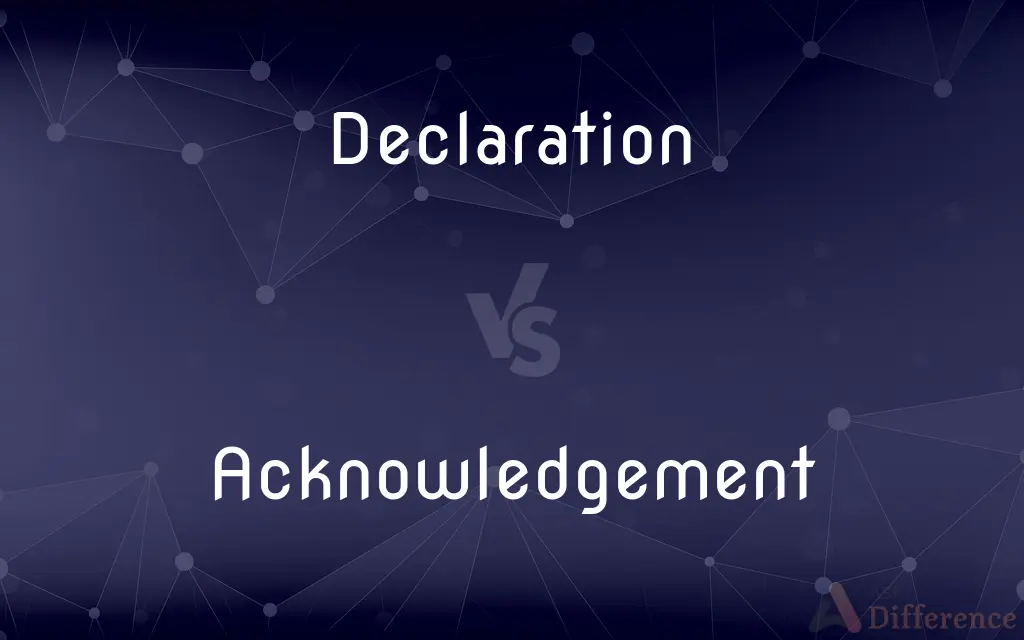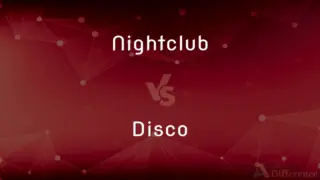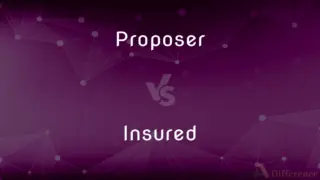Declaration vs. Acknowledgement — What's the Difference?
Edited by Tayyaba Rehman — By Fiza Rafique — Updated on March 19, 2024
A declaration is a formal statement, often in writing, affirming something's truth, whereas an acknowledgement recognizes or admits the truth of something or someone's contribution.

Difference Between Declaration and Acknowledgement
Table of Contents
ADVERTISEMENT
Key Differences
Declarations are often formal and official statements, used to assert truth or facts, typically requiring legal validation or witness. They are commonly used in legal, governmental, or formal settings to state intentions, decisions, or conditions unequivocally. Acknowledgements, on the other hand, are acts of recognizing or admitting the truth or existence of something. They can also refer to expressions of gratitude or appreciation towards others' contributions or efforts.
While declarations are usually binding and carry a legal or formal weight, acknowledgements are more about giving credit, expressing gratitude, or recognizing facts without the inherent need for legal backing. A declaration might establish a new state of affairs or assert rights, whereas an acknowledgement might simply note someone's help in a project.
Declarations often involve a unilateral statement made by one party, and the focus is on the content of the declaration itself. Acknowledgements, while they can be unilateral, often imply a relationship or interaction between the acknowledger and what or who is being acknowledged, emphasizing the act of recognition or gratitude.
The purpose and context of a declaration can significantly differ from that of an acknowledgement. Declarations are often aimed at asserting authority, rights, or intentions, especially in legal or formal contexts. Acknowledgements, however, primarily serve to express gratitude, give credit, or recognize the validity of something without necessarily asserting something new.
Comparison Chart
Nature
Formal, assertive
Recognition, appreciation
ADVERTISEMENT
Context
Legal, official, governmental
Academic, literary, professional
Purpose
Assert truth, state intentions or rights
Give credit, express gratitude, recognize truth
Legal Implications
Often carries legal weight or formal significance
Usually without legal implications
Focus
On the content and assertion
On the act of recognizing or crediting
Compare with Definitions
Declaration
A formal announcement or statement.
The company made a declaration of its financial stability.
Acknowledgement
Recognition or admission of the truth.
His acknowledgement of the mistake was the first step to correction.
Declaration
A legally binding statement or document.
The declaration of independence was signed by 56 delegates.
Acknowledgement
An expression of gratitude.
The author's acknowledgement in the book thanked her mentor.
Declaration
A clear assertion of a fact or belief.
Her declaration of love was unexpected but sincere.
Acknowledgement
Recognition of a contribution or influence.
The scientist's acknowledgement of her colleague's work was heartwarming.
Declaration
A formal expression of opinion or intention.
His declaration to run for office surprised many.
Acknowledgement
A nod to the presence or significance of something.
The teacher's acknowledgement of the student's progress was encouraging.
Declaration
A proclamation or announcement of significant importance.
The president issued a declaration of emergency.
Acknowledgement
Admitting the receipt or existence of something.
The acknowledgement of the application gave them hope.
Declaration
A formal or explicit statement or announcement
A declaration of love
Acknowledgement
The act of admitting the existence or truth of something
Acknowledgment that the service was poor.
Declaration
An act of declaring an innings closed.
Acknowledgement
Recognition or notice
Peace based on acknowledgment of a nation's sovereignty.
Declaration
An explicit, formal announcement, either oral or written.
Acknowledgement
An expression of thanks or appreciation
Included acknowledgments of people who helped in making the book.
Declaration
The act or process of declaring.
Acknowledgement
An answer or response in return for something
Sent an acknowledgment of receipt of the letter.
Declaration
A statement of taxable goods or of properties subject to duty.
Acknowledgement
(Law) The formal avowal of an act before a legally empowered officer, such as a judge or notary public, to ensure that the act will be legally recognized.
Declaration
A formal statement initiating a lawsuit by specifying the facts and legal grounds for the relief sought; a complaint or petition.
Acknowledgement
Alternative spelling of acknowledgment
Declaration
An unsworn statement of facts that is admissible as evidence.
Acknowledgement
The state or quality of being recognized or acknowledged;
The partners were delighted with the recognition of their work
She seems to avoid much in the way of recognition or acknowledgement of feminist work prior to her own
Declaration
A bid, especially the final bid of a hand in certain card games.
Acknowledgement
A statement acknowledging something or someone;
She must have seen him but she gave no sign of acknowledgment
The preface contained an acknowledgment of those who had helped her
Declaration
A meld.
Declaration
A written or oral indication of a fact, opinion, intention, belief, etc.
A declaration of love
Declaration
A list of items for various legal purposes, e.g. customs declaration.
Declaration
The act or process of declaring.
Declaration
(cricket) The act, by the captain of a batting side, of declaring an innings closed.
Declaration
(legal) In common law, the formal document specifying plaintiff's cause of action, including the facts necessary to sustain a proper cause of action, and to advise the defendant of the grounds upon which he is being sued.
Declaration
(computing) The specification of an object, such as a variable or function, establishing its existence but not necessarily describing its contents.
Declaration
The act of declaring, or publicly announcing; explicit asserting; undisguised token of a ground or side taken on any subject; proclamation; exposition; as, the declaration of an opinion; a declaration of war, etc.
Declaration
That which is declared or proclaimed; announcement; distinct statement; formal expression; avowal.
Declarations of mercy and love . . . in the Gospel.
Declaration
The document or instrument containing such statement or proclamation; as, the Declaration of Independence (now preserved in Washington).
In 1776 the Americans laid before Europe that noble Declaration, which ought to be hung up in the nursery of every king, and blazoned on the porch of every royal palace.
Declaration
A statement that is emphatic and explicit (spoken or written)
Declaration
(law) unsworn statement that can be admitted in evidence in a legal transaction;
His declaration of innocence
Declaration
A statement of taxable goods or of dutiable properties
Declaration
(contract bridge) the highest bid becomes the contract setting the number of tricks that the bidder must make
Declaration
A formal public statement;
The government made an announcement about changes in the drug war
A declaration of independence
Declaration
A formal expression by a meeting; agreed to by a vote
Common Curiosities
What is a declaration?
A declaration is a formal statement or announcement, often asserting a fact or intention.
How is a declaration different from an announcement?
A declaration is a formal and often legally significant statement, whereas an announcement can be less formal and without legal implications.
What does acknowledgement mean?
Acknowledgement refers to the act of recognizing or admitting the truth, existence, or contribution of something or someone.
Can a declaration change legal status?
Yes, certain declarations, such as those of independence or bankruptcy, can significantly change legal status.
Can a declaration be verbal?
Yes, declarations can be verbal, though they are often formalized in writing, especially in legal contexts.
Is an acknowledgement legally binding?
Acknowledgements are generally not legally binding; they are more about recognition or gratitude.
Are acknowledgements necessary in academic papers?
While not legally required, acknowledgements in academic papers are a standard practice to credit contributors and influences.
Can acknowledgements be part of legal documents?
Yes, acknowledgements can be part of legal documents, often to recognize signatures or attestations.
What role do declarations play in international relations?
Declarations can significantly impact international relations, especially when they pertain to policies, sovereignty, or human rights.
Can an acknowledgement have legal consequences?
In some contexts, such as acknowledging debt or a contractual obligation, acknowledgements can have legal consequences.
How are declarations used in personal contexts?
In personal contexts, declarations might involve stating intentions or feelings, such as commitments in relationships.
Do declarations always require a witness?
Many declarations, especially those with legal implications, require a witness or official validation.
Is it common to acknowledge someone in a professional setting?
Acknowledging colleagues or collaborators in a professional setting is common and fosters goodwill and recognition.
Why are acknowledgements important in cultural contexts?
Acknowledgements in cultural contexts can show respect for traditions, contributions, or territorial acknowledgments.
Can a declaration also include an acknowledgement?
Yes, a declaration can include acknowledgements, especially when recognizing previous agreements or contributions.
Share Your Discovery

Previous Comparison
Nightclub vs. Disco
Next Comparison
Proposer vs. InsuredAuthor Spotlight
Written by
Fiza RafiqueFiza Rafique is a skilled content writer at AskDifference.com, where she meticulously refines and enhances written pieces. Drawing from her vast editorial expertise, Fiza ensures clarity, accuracy, and precision in every article. Passionate about language, she continually seeks to elevate the quality of content for readers worldwide.
Edited by
Tayyaba RehmanTayyaba Rehman is a distinguished writer, currently serving as a primary contributor to askdifference.com. As a researcher in semantics and etymology, Tayyaba's passion for the complexity of languages and their distinctions has found a perfect home on the platform. Tayyaba delves into the intricacies of language, distinguishing between commonly confused words and phrases, thereby providing clarity for readers worldwide.
















































